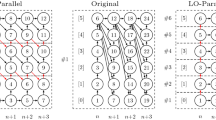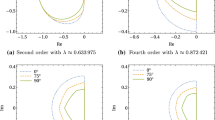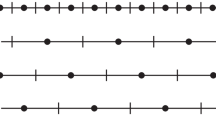Abstract
For the parallel integration of stiff initial value problems (IVPs) three main approaches can be distinguished: approaches based on “parallelism across the problem”, on “parallelism across the method” and on “parallelism across the steps”. The first type of parallelism does not require special integration methods can be exploited within any available IVP solver. The methodparallel approach received some attention in the case of Runge-Kutta based methods. For these methods, the required number of processors is roughly half the order of the generating Runge-Kutta method and the speed-up with respect to a good sequential IVP solver is about a factor 2. The third type of parallelism (step-parallelism) can be achieved in any IVP solver based on predictor-corrector iteration. Most step-parallel methods proposed so far employ a large number of processors, but lack the property of robustness, due to a poor convergence behaviour in the iteration process. Hence, the effective speed-up is rather poor. The step-parallel iteraction process proposed in the present paper is less massively parallel, but turns out to be sufficiently robust to solve the four-stage Radau IIA corrector used in our experiments within a few effective iterations per step and to achieve speed-up factors up to 10 with respect to the best sequential codes.
Similar content being viewed by others
References
A. Bellen, Parallelism across the steps for difference and differential equations, in:Numerical Methods for Ordinary Differential Equations, Lecture Notes in Mathematics 1386 (Springer, 1987) pp. 22–35.
A. Bellen, R. Vermiglio and M. Zennaro, Parallel ODE-solvers with stepsize control, J. Comp. Appl. Math. 31 (1990) 277–293.
K. Burrage, The search for the Holy Grail, or Predictor-Corrector methods for solving ODEIVPs. Appl. Numer. Math. 11 (1993) 125–141.
J.C. Butcher, On the convergence of numerical solutions to ordinary differential equations, Math. Comp. 20 (1966) 1–10.
J.C. Butcher,The Numerical Analysis of Ordinary Differential Equations, Runge-Kutta and General Linear Methods (Wiley, Chichester/New York/Brisbane/Toronto/Singapore, 1987).
P. Chartier,Parallelism in the numerical solution of initial value problems for ODEs and DAEs, Thesis, Université de Rennes I, France (1993).
W.H. Enright, T.E. Hull and B. Lindberg, Comparing numerical methods for stiff systems of ODEs, BIT 15 (1975) 10–48.
C.W. Gear and K.W. Tu, The effect of variable mesh size on the stability of multistep methods, SIAM J. Numer. Anal. 11, (1974) 1025–1043.
E. Hairer and G. Wanner,Solving Ordinary Differential Equations, II: Stiff and Differential Algebraic Problems (Springer, Berlin, 1991).
P.J. van der Houwen and B.P. Sommeijer, Iterated Runge-Kutta methods on parallel computers, SIAM J. Sci. Stat. Comp. 12 (1991) 1000–1028.
P.J. van der Houwen and B.P. Sommeijer, Preconditioning in parallel Runge-Kutta methods for stiff initial value problems, to appear in CMA (1994).
P.J. van der Houwen, B.P. Sommeijer and W. Couzy, Embedded diagonally implicit Runge-Kutta algorithms on parallel computers, Math. Comp. 58 (1992) 135–159.
P.J. van der Houwen, B.P. Sommeijer and W.A. van der Veen, Parallel interaction across the steps of high order Runge-Kutta methods for nonstiff initial value problems, to appear in JCAM (1994).
P. Kaps, Rosenbrock-type methods, in:Numerical Methods for Stiff Initial Value Problems, eds. G. Dahlquist and R. Jeltsch, Bericht nr. 9, Inst. für Geometrie und Praktische Mathematik der RWTH Aachen (1981).
J.D. Lambert,Numerical Methods for Ordinary Differential Equations, (Wiley, New York, 1991).
B.P. Sommeijer, Parallelism in the numerical integration of initial value problems, Thesis, University of Amsterdam (1992).
D.M. Young,Iterative Solution of Large Linear Systems (Academic Press,New York, 1971).
W.A. van der Veen, Performance of step-parallelism in Runge-Kutta methods for stiff initialvalue problems, in preparation (1994).
Author information
Authors and Affiliations
Additional information
Communicated by J.C. Butcher
The research reported in this paper was partly supported by the Technology Foundation (STW) in the Netherlands.
Rights and permissions
About this article
Cite this article
van der Houwen, P.J., Sommeijer, B.P. & van der Veen, W.A. Parallelism across the steps in iterated Runge-Kutta methods for stiff initial value problems. Numer Algor 8, 293–312 (1994). https://doi.org/10.1007/BF02142695
Received:
Revised:
Issue Date:
DOI: https://doi.org/10.1007/BF02142695




